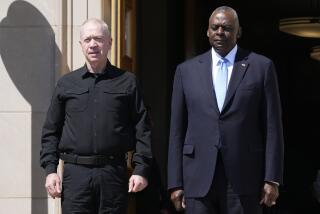U.S. Denounces Libya, Hints Retaliation Over Terrorists : White House Proposal: ‘Go at ‘em’
- Share via
The White House, in an abrupt departure from its initial reaction urging restraint in the wake of the airport massacres in Rome and Vienna, today denounced Libya for its alleged support of the Palestinian terrorists suspected of masterminding the attacks and hinted at possible U.S. military retaliation against it.
Presidential spokesman Larry Speakes, briefing reporters in Palm Springs, where President Reagan is vacationing, refused to disclose what steps may be contemplated but said military action “is always an option” in combatting terrorism.
Asked whether the Administration regards the Libyan regime of Moammar Kadafi as responsible for the attacks in Rome and Vienna in which 18 people, including five Americans, were killed, Speakes said, “We can’t be that specific.”
But he added that “all evidence is pointing to” a radical Palestinian splinter group headed by Abu Nidal, who Speakes said is believed to be in Libya. He said the Libyan government provides Abu Nidal with financial assistance and an operating base.
State Dept. Hints Too
In Washington, the State Department also hinted today at possible U.S. military action against Libya.
“The military option is one that we have always retained,” department spokesman Charles Redman said, adding that other steps that do not require the use of military force are also under consideration. In addition, he said, it is possible that several responses might be used simultaneously.
Redman’s carefully worded responses to questions at the department’s daily press briefing were intentionally ambiguous. But there seemed to be little doubt that he intended to pinpoint Libya as the primary target of any U.S. retaliation.
The White House on Saturday urged Israel to avoid direct retaliation for the attacks near the Israeli El Al Airline counters in Rome and Vienna. But Speakes said today, “Our policy is that you seek out those responsible and . . . have at it, go at ‘em.”
He said the U.S. policy is balanced, urging restraint to avoid retaliation against innocent people or action that could disrupt the Middle East peace process, while reserving the right for the United States or other governments to seek out, identify and punish terrorists, wherever they may hide.
‘We Keep Our Options Open’
“The evidence is still being analyzed” since the airport attacks, Speakes said. “All indications so far point to Abu Nidal’s group. Other governments directly concerned share this judgment.
“As far as what the United States would do in retaliation, we never comment on what we might do. We keep our options open.”
But, the spokesman added, “we also note with considerable interest that the Libyan government has applauded the attacks in Rome and Vienna as heroic acts. We believe that the Libyan government has given this group a considerable amount of financing and assistance.”
The United States, which has long branded the Libyan regime as an instigator of international terrorism, has sought to isolate it by invoking various sanctions, including a ban on exports of militarily useful equipment.
“We believe that other governments now recognize the need to take actions,” Speakes said. “We are ready to work with them on coordinated efforts.”
More to Read
Get the L.A. Times Politics newsletter
Deeply reported insights into legislation, politics and policy from Sacramento, Washington and beyond. In your inbox twice per week.
You may occasionally receive promotional content from the Los Angeles Times.






